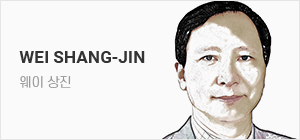| ||
| US vice-president Kamala Harris outlined her vision for an ''opportunity economy'' in her acceptance speech at the Democratic National Convention in Chicago on Thursday-Andrew Caballero-Reynolds/AFP/Getty ImagesConvention Thursday, Aug. 22, 2024, in Chicago. [AP Photo/Brynn Anderson] |
| ||
| Former President Donald Trump raises his fist July 18, 2024, during his speech the Republican National Convention in Milwaukee.[AP] |

One of the biggest uncertainties hanging over the world economy is who will be the US President after its November election. The replacement of President Biden by Kamala Harris on top of the Democrat‘s ticket has raised the level of uncertainty as she has erased the lead by former President Trump in the polls. Even though the United States has only 5% of the world population and 15% of the world’s value added, it has a dominant role in world economy, politics, and military posture (and is the only country that has veto power at the International Monetary Fund). While it no long is the world‘s only or even the largest growth engine, it is still the case that “when the US sneezes, the world catches a cold.”
The US tariff and trade policy will have an obvious and direct impact on many other economies. By affecting the structure of the US economy and indirectly affects its trade flows, US industrial policies of the United States will also affect the world economy. Harris and Trump have some differences on their views on fiscal and monetary policies, which also produce an indirect effect on the world.
US Tariff and Trade Policies
Trump has said he will raise the US tariffs on imports from China to 60%, and those on imports from all other countries to 10%. This will likely trigger retaliatory tariff responses from other countries. The proposed Trump tariffs will be a violation of multiple US legal obligations under the World Trade Organization. But the US has made the WTO‘s trade dispute settlement so ineffectual that its violations will not produce much direct harm to itself in the near future.
However, they will be a major disruption not only to the global flow of goods but to world economic growth. While the Chinese exports to the US will take the biggest hit, most other countries‘ exports to the US will also decline given the higher trade barriers in the US. An exception is those countries whose exports to the US are a substitute for the Chinese goods.
If the US escalation of the trade war manages to reduce the Chinese economic growth further, that will translate into a reduced demand by China for other countries‘ goods. This effect is more important for countries that currently have China as a leading trading partner. They include Korea, Japan, and Southeast Asian nations.
Moreover, many firms in these countries and Chinese firms form a part of global production chains. For example, many Korean and Japanese firms export parts and components to China, to be combined with China-made parts and components, or assembled in China into final products that are then exported to the United States and other countries. This means that any reduction in Chinese exports to the United States indirectly translates into a reduction in the exports of parts and components from Korea, Japan, and other countries. Many countries will seek to re-establish supply chains with firms in India, Vietnam, and other places, but such actions often only imperfectly address the efficiency problem.
Besides these relatively obvious predictions, there are two other less obvious effects on the world trade flows that are nevertheless also significant from the Trump tariff increases. First, the US exports to many countries will likely decline (relative to what would have happened without the Trump shock). This seemingly surprising prediction stems from a macroeconomic balance restriction: the overall US trade deficit is determined less by US unilateral trade policies but more by a shortage of US national savings relative to US investment. As the Trump trade shock is unlikely to dramatically improve the US savings, the reduction in the US imports from the rest of the world is likely to be matched by a reduction in the US exports to the rest of the world. This powerful economic logic is not well understood by many politicians or journalists. This means that the Trump tariffs will further reduce the relative importance of the United States as a trading partner for many countries.
Second, the Trump tariff shock, by thumbing the nose at the World Trade Organization again, will further undermine the rules-based global economic order that the US has helped to put together. If the WTO cannot check the illegal protectionist policies of the US, many more countries will be tempted to raise their tariffs or otherwise engage in protectionist policies. Such temptation is especially strong in countries with a severe domestic income inequality problem where tariffs and other import barriers are sold by populist politicians as a solution to the inequality problem.
Harris‘ policies on tariffs are less clear. Since she is the Vice President to Biden, she could adopt President Biden’s approach to tariffs and trade (which is the worst part of President Biden‘s economic policy legacy). If this is the case, the Harris Administration will also preside over a relative decline of the United States as a trading nation, though the decline will not be as fast as under Trump.
However, a future President Harris could differ from President Biden in two important ways. First, she could instead look to other recent Democratic presidents for inspiration for trade policies: Barack Obama and Bill Clinton. In particular, she could find ways to revive the US leadership in global trade negotiations, including a return to a reformed Comprehensive and Progressive Trans-Pacific Partnership (CPTPP). CPTPP was originally a regional trade agreement championed by the United States under the Obama administration that not only promotes greater market access among the member countries but also imposes stronger institutional requirements on the conduct of state-owned firms, government procurement and subsidy rules. Because these added institutional rules, it may be considered “WTO plus” in terms of its ability to induce institutional reforms by member countries.
CPTPP was eventually concluded in 2018 with 12 member countries but without the United States. While the many stringent rules of the CPTPP currently disqualify China as a possible member, China has since applied for its membership, signaling its willingness to engage in policy reforms to conform with the rules on state-owned firms and market access.
Second, a future Harris administration can also reverse the Trump-Biden tariffs on China. Since these tariffs are a tax on American households, especially middle-class and low-income families, Harris and her economic team should be able to articulate the benefits of removing these harmful taxes on the Americans. They should be able to explain why the tariffs have raised the cost of living without creating new jobs for American workers.
To summarize, a Trump Presidency will mean another negative shock to the global trading system, creating far more losers in the world than the winners. There is no guarantee that President Harris will pick the right trade advisors or be able to overcome the protectionist force within the Democratic Party. But if she is able to combine domestic redistribution policies together with a relatively open trade agenda, including joining CPTPP and reversing the Trump tariffs, she may usher in a period of global trade revival under a best-version of the US global economic leadership.
US Industrial Policy
Harris and Trump both favor industrial policies ― the use of tax incentives, subsidies, government procurement, or tariffs to give American firm an edge in certain sectors that free market on its own would not. So the difference between the two is not so much in a big versus small government, but in which sectors.
Harris will likely favor government incentive programs in industries with a relatively high degree of unionization. She will likely continue Biden‘s policy of massive subsidies to the semiconductor sector in the name of supply chain resilience. Her administration will also favor environmentally friendly jobs and correspondingly be a bit cool in jobs with a heavy carbon emission. An important exception may be a continuation of the Biden tariffs on the imports of Chinese electronic vehicles, even if such tariffs will slow down the US transition to a low-carbon society.
Trump does not care about climate change and view rejecting pro-climate policies as an opportunity to peel labor support away from the Democrats. Trump may not oppose Biden-Harris‘ industrial policies in any sectors on an ideological ground, but he may reverse many such policies on a political ground. That is, he may not want these policies to succeed just because they are initiated by President Biden. He may start his own industrial policies based on where the donation or political support come from.
For the rest of the world, it is useful to recognize that all US industrial policies, if effectively implemented, tend to alter the US economic structure. Those sectors encouraged by government policies, such as computer chip manufacturing under President Biden and Kamala Harris, can lead to an increase in the US production capacity at the expense of the rest of the world. They could lead a reduction of the US imports from Korea, Japan, and other countries, or an increase in the US exports to other countries.
Even with possible US over-capacity in certain sectors, its overall impact on the rest of the world may not be bad. (As an analogy, if the Chinese industrial policy in shipbuilding drives up its shipping building capacity and drives down the global prices of cargo ships, they hurt the shipbuilders in a small number of countries, but benefit virtually all other sectors and consumers in all countries.)
US Fiscal Policy
Both Harris and Trump will likely produce an increase in the US fiscal deficit, and Trump‘s deficit is likely to be bigger. On the campaign trails, both presidential candidates have promised a myriad of tax cuts for specific groups. Trump mused about waiving the tax on tip income received by restaurant workers and hotel staff. Harris has made a similar promise. If there is anything good about this particular promise, it is that these are low-income earners that could use some help, and the tax on the tip income is a tiny fraction of the government revenue.
A problem with such ad hoc promises is that they create an uneven field for people with different income sources. Many poor people do not have an income that takes the form of a tip. A much better policy would be a uniform reduction in the tax rate (or an outright subsidy) for people with an income below a threshold.
Another problem is that when politicians promise ad hoc tax cuts, someone else will have to pay for the cuts. The payment may involve a reduction in government-provided benefits, a higher tax by other groups, or a higher tax on future generations. While Kamala Harris says that she plans to raise the corporate income tax, Trump has so far refused to say how he will pay for it.
An expansionary fiscal policy in the United States tends to raise the US imports from the rest of the world, holding everything else constant. But a greater fiscal deficit could push up the interest rate on US government bonds, which could in turn push up the private sector borrowing cost in the US, and transmit to other countries in the form of higher borrowing costs by corporations and governments, unless the US Federal Reserve does something to offset it. This brings us to the US monetary policy.
US Monetary Policy
An adjustment in the US interest rate in either direction tends to have ramifications for other countries through changes in other countries‘ interest rates, exchange rates, cross-border capital flows, and chances of a financial crisis. In principle, the US central bank decides on the appropriate interest rate based on its independent judgment of the inflation, unemployment, and financial stability in the economy, free of political pressure from the White House. In that sense, it should not matter whether it is Kamala Harris or Donald Trump who sits in the White House after January 20, 2025.
However, who the US president is can matter in two ways. First, both Donald Trump and his running mate JD Vance have said that they wanted a say in the US interest rate. In particular, they would like a low US interest rate and a devalued US dollar if they take over the White House. They will take credit for any boost to the US economic growth from such monetary policy and blame the legacy of the Biden-Harris administration for any resulting inflationary problem. Because the US president gets to nominate Federal Reserve governors, including its chair, the White House could find pliant candidates to lead the central bank. In contrast, Harris has said that she will respect the independence of the Federal Reserve, which presumably means tolerating likely increases in the US interest rate during her presidency.
Second, because the fiscal policy choice affects US inflation and unemployment, which in turn affect the actions by the US central bank, the White House influences the conduct of the Federal Reserve even if the latter is independent. In the absence of a direct interference by the White House in the US monetary policy, the Trump fiscal policy is actually more likely to produce a higher interest rate and a somewhat stronger dollar. With political interference in the Federal Reserve decision making, the difference in the US monetary policy under Harris versus Trump presidency could be smaller if the Federal Reserve cannot fully isolate itself from politics.



해리스 vs 트럼프 차기 미 대통령이 세계 경제에 갖는 의미
지금 세계 경제에 드리운 가장 큰 불확실성 중 하나는 과연 11월 미국 대통령 선거 후, 누가 미국 대통령이 될 것인가다. 조 바이든 대통령을 대신해 민주당 대선 후보가 된 카멀라 해리스가 여론 조사에서 앞서가던 트럼프 전 대통령을 추월하면서 불확실성이 고조됐다. 미국은 전 세계 인구의 단 5%, 부가가치의 15%만을 차지하지만, 세계 경제, 정치, 군사에서 주도적인 역할을 하고 있다(그리고 국제통화기금에서 거부권을 가진 유일한 나라다). 세계의 성장엔진으로서 미국은 더 이상 유일하지도, 가장 크지도 않지만, “미국이 기침을 하면 세계가 감기에 걸린다”는 말은 여전히 사실이다.
미국의 관세·무역 정책은 많은 나라에 확실하고도 직접적인 영향을 줄 것이다. 미국의 산업 정책은 미국 경제 구조에 영향을 끼치고 미국의 무역 흐름에 간접적인 영향을 줌으로써 세계 경제에도 영향을 미칠 것이다. 해리스와 트럼프는 재정과 통화 정책에서 견해차가 있는데, 이 역시 세계에 간접적으로 영향을 준다.
미국의 관세 및 무역 정책
트럼프는 중국산 수입품에 대한 관세를 60%로, 나머지 국가의 수입품에 대한 관세를 10%로 인상하겠다고 밝혔다. 이것은 다른 나라들의 보복 관세를 유발할 수도 있을 것이다. 트럼프가 제시한 관세는 세계무역기구(WTO)상 미국의 법적 의무를 다수 위반한다. 그러나 미국이 WTO의 무역분쟁 해결제도를 유명무실하게 만들어 버렸기 때문에, 규칙을 위반했다고 해서 당장 미국이 그렇게 큰 직접적 손해를 입지는 않을 것이다.
그러나 미국의 WTO 위반은 전세계적 물자의 흐름뿐 아니라 세계의 경제 성장에도 큰 방해가 될 것이다. 중국의 대미 수출이 가장 큰 타격을 받겠지만, 미국의 무역 장벽이 높아진다는 점에서, 다른 대다수 국가의 대미 수출 역시 감소할 것이다. 다만 미국에 중국산 제품의 대체제를 수출하는 국가는 예외다.
만일 미국이 무역전쟁 확전을 통해 중국의 경제 성장을 더 위축시키는 데 성공한다면, 다른 나라 상품에 대한 중국의 수요도 줄어들 것이다. 이런 효과는 현재 중국을 주요 무역 파트너로 삼고 있는 나라들에는 더욱 중요하다. 여기에는 한국, 일본, 그리고 동남아시아 국가들이 포함된다.
더구나 이 나라들에 속한 많은 기업과 중국 기업은 글로벌 생산 사슬의 일부를 형성하고 있다. 예를 들어 많은 한국, 일본 기업들이 중국에 부품을 수출하고, 이 부품들은 중국산 부품과 조합되거나 중국에서 완제품으로 조립된 다음 미국을 비롯한 다른 국가로 수출된다. 즉, 중국의 대미 수출이 감소한다는 것은 간접적으로 한국, 일본 등 다른 국가에서 생산된 부품의 수출도 줄어든다는 의미다. 많은 나라가 인도, 베트남 등 다른 지역의 기업과 공급망을 다시 구축하려 하겠지만, 이런 조치는 일반적으로는 효율성 문제를 완전히 해소하지 못한다.
이렇게 상대적으로 분명한 예측 외에도, 트럼프의 관세 인상이 세계 무역 흐름에 미치는 영향 중에는 드러나지는 않지만 중요한 두 가지 것이 더 있다. 첫째, (트럼프 쇼크가 없었다고 가정할 경우에 비해) 미국의 대외 수출량이 감소할 가능성이 높다. 언뜻 보기에 놀라울 수도 있는 이 예측은 거시경제적 균형 제한에서 비롯된 것이다. 즉, 미국의 전체 무역 적자는 미국의 일방적 무역 정책보다는 미국의 투자 대비 총저축 부족에 더 크게 좌우된다. 트럼프의 무역 쇼크가 미국의 저축을 극적으로 향상시킬 가능성은 별로 없으니, 미국이 세계로부터 수입을 줄이는 것은 미국의 대외 수출이 줄어드는 것과 비슷할 가능성이 높다. 이 강력한 경제 논리를 많은 정치인과 언론인이 잘 이해하지 못하고 있다. 이것은 곧 많은 나라의 입장에서 볼 때, 트럼프 관세가 무역 파트너로서 미국의 상대적 중요성을 더 떨어뜨릴 것임을 의미한다.
둘째, 트럼프의 관세 쇼크는 다시 한번 세계무역기구를 조롱함으로써 미국이 구축에 일익을 담당했던 규칙 기반의 세계 경제 질서를 더욱 약화시킬 것이다. WTO가 미국의 불법적인 보호주의 정책을 견제하지 못한다면, 관세를 인상하거나 다른 보호주의 정책을 펼치고 싶은 유혹을 느끼는 나라들이 더욱 많아질 것이다. 그런 유혹은 특히 국내의 소득불균형 문제가 심각하고, 포퓰리스트 정치인들이 관세 등 수입 장벽을 불평등 문제의 해결책으로 내세우는 나라에서 특히 강렬하다.
해리스의 관세 정책은 이보다 불투명하다. 바이든의 부통령이라는 점에서 해리스는 바이든 대통령의 관세·무역 정책(바이든 대통령이 남긴 경제 정책 중 최악인 부분이다)을 받아들일 수도 있다. 만일 그렇다면, 해리스 행정부는 비록 트럼프 정권에서만큼 빠르지는 않겠지만, 무역국으로서 미국의 상대적 위축을 주도하게 될 것이다.
하지만 해리스가 대통령에 당선된다면 두 가지 중요한 면에서 바이든 대통령과 차이가 있을 수 있다. 첫째, 해리스는 무역 정책에서 최근 역임했던 다른 민주당 출신 대통령, 즉 버락 오바마와 빌 클린턴을 참고할 수도 있다. 특히 그는 변경된 포괄적·점진적 환태평양경제동반자협정(CPTPP)으로 복귀하는 등 세계 무역 협상에서 미국의 리더십을 되찾을 방안을 모색할 수도 있다. CPTPP는 원래 오바마 행정부 당시 미국이 지지했던 지역 무역 협정으로, 회원국 간의 시장 접근성 개선을 도모하고 국영 기업의 행위, 정부 조달 및 보조금 규칙에 대한 제도적 요건을 강화하는 내용을 담고 있다. 이런 추가적인 제도적 규칙 탓에 CPTPP는 회원국 주도의 제도 개선을 유도할 수 있다는 점에서 “WTO 플러스”로 볼 수도 있다.
CPTPP는 결국 2018년 미국 없이 12개 회원국으로 체결됐다. CPTPP의 여러 엄격한 규정 상 중국은 현재 회원국이 될 자격이 없지만, 중국은 이후 회원 가입을 신청하면서 국영 기업 및 시장 접근성에 대한 규정을 준수하는 정책 개혁을 단행하겠다는 의사를 내비쳤다.
둘째, 미래의 해리스 행정부는 중국에 대한 트럼프-바이든 관세를 번복할 수도 있다. 그럴 경우, 트럼프-바이든 관세는 미국 가계, 특히 중산층과 저소득층에 대한 세금이기 때문에 해리스와 그의 경제팀은 미국인에 대한 이 해로운 세금을 철폐할 때 생기는 장점이 무엇인지 명확히 말할 수 있어야 한다. 그들은 이 관세가 왜 미국 노동자에게 새로운 일자리를 창출하지 않고 생계비만 올려 놓았는지 그 이유를 설명할 수 있어야 한다.
요약하자면, 트럼프의 대통령 당선은 세계 무역 시스템이 또 한 번의 부정적 충격을 받게 되고, 세계에 승자보다 패자가 훨씬 많아진다는 의미가 될 것이다. 해리스가 적합한 무역 고문을 인선하거나 민주당 내의 보호주의 세력을 극복할 수 있으리라는 보장은 없다. 그러나 그가 국내의 재분배 정책을 CPTPP 참여와 트럼프 관세의 철폐 등 비교적 개방적인 무역 어젠다와 결합할 수 있다면, 해리스는 미국의 세계 경제 리더십이 최상으로 발휘되는 가운데 세계 무역의 중흥기를 열 수도 있을 것이다.
미국의 산업 정책
해리스와 트럼프 모두 특정 영역에서 미국 기업이 우위를 점할 수 있도록 세제 혜택, 보조금, 정부 조달을 활용하는, 자유 시장에서는 존재하지 않을 산업 정책을 선호한다.
해리스는 노조 조직률이 비교적 높은 산업에 대한 정부 인센티브 프로그램을 지지할 가능성이 크다. 그는 공급망의 회복탄력성이라는 미명 하에 반도체 부문에 막대한 보조금을 지급하는 바이든의 정책을 유지할 것으로 보인다. 해리스 행정부는 또한 친환경 일자리를 선호할 것이고, 탄소 배출량이 많은 일자리에는 그만큼 냉담할 것이다. 한 가지 중요한 예외로 중국산 전기차 수입에 대한 바이든의 관세는 비록 미국이 저탄소 사회로 전환하는 시기가 지연될지라도 계승할 가능성이 있다.
트럼프는 기후변화에 신경 쓰지 않으며, 친기후 정책을 거부하는 것이 민주당에 대한 노동자층의 지지를 깎아 먹는 기회라고 생각한다. 트럼프는 이념적으로는 바이든-해리스의 산업 정책에 반대하지 않을 수도 있지만, 정치적인 이유로 그 중 상당수를 뒤엎을 수 있다. 즉, 그는 단지 이 정책들을 시작한 것이 바이든 대통령이라는 이유로 이 정책들의 성공을 원치 않을 수 있다는 말이다. 그는 자신의 기부자 혹은 정치적 지지 기반을 바탕으로 자신만의 산업 정책을 꾸릴 수도 있다.
다른 나라들은 어떤 미국의 산업 정책이든 일단 실제로 시행되면 미국의 경제 구조가 바뀌는 경향이 있음을 인식하고 있는 것이 좋다. 바이든-카멀라 해리스 행정부 하에서 컴퓨터 칩 제조가 그랬듯이 정부 정책이 독려하는 부문은 다른 나라들에 해를 입혀가면서 미국의 생산 능력을 확대시킬 수 있다. 그런 부문들은 한국, 일본 등 다른 나라의 대미 수출을 감소시키거나 미국에서 대외 수출을 증가시키는 유인이 될 수 있다.
미국이 특정 부문에서 과잉생산 가능성이 있다해도, 그것이 세계에 미치는 전반적인 영향은 나쁘지 않을 수도 있다(비유하자면, 가령 중국의 조선 산업 정책이 중국의 조선 능력을 확대시키고, 화물선의 전세계적 가격을 하락시킨다면, 이는 소수 국가의 조선업자들에게는 타격을 주겠지만, 모든 국가의 사실상 나머지 모든 부문과 소비자에게는 이득이 된다.)
미국의 재정 정책
해리스와 트럼프는 둘 다 미국의 재정적자를 확대시킬 가능성이 크며, 트럼프의 경우 적자 확대 폭이 더 클 것으로 보인다. 유세 현장에서 두 후보는 모두 구체적인 집단 별로 수많은 감세 조치를 약속했다. 트럼프는 식당 노동자와 호텔 직원이 받는 팁 소득에 대한 세금을 면제해 주는 방안을 고려하고 있다. 해리스도 비슷한 공약을 내놓았다. 이 공약에서 굳이 좋은 점을 찾아보자면, 그것은 도움이 필요할 수도 있는 저소득자가 그 대상이며, 팁 소득에 대한 세금은 정부 세입의 극히 일부에 불과하다는 점이다.
이런 임시변통식 공약의 한 가지 문제점은 이것이 소득원이 서로 다른 사람들 간에 불공평한 환경을 조성한다는 것이다. 가난한 이들 중 상당수는 팁이라는 형식으로 소득을 벌지 않는다. 소득이 특정 기준 이하의 이들을 대상으로 일률적으로 세율을 인하하는 것(혹은 직접적으로 보조금을 지급하는 것)이 훨씬 나은 정책이다. 또 한 가지 문제는 정치인들이 급조된 감세를 약속하면, 다른 누군가가 그 감세분을 지불해야 한다는 것이다. 그것은 정부가 제공했던 혜택의 축소, 다른 그룹에 대한 세금 인상, 혹은 다음 세대에 대한 세금 인상이 될 수 있다. 카멀라 해리스는 법인세를 올리겠다고 말했지만, 트럼프는 지금까지 그 감세분을 어떻게 메꿀 것인지 밝히지 않았다.
미국의 확장적 재정 정책은 미국의 대외수입을 증가시키고, 나머지는 모두 일정하게 유지시키는 경향이 있다. 그러나 재정 적자가 확대되면 미국 국채 이자율이 높아져, 미국 연방준비제도가 이를 상쇄하기 위해 어떤 조치를 취하지 않으면, 미국 내 민간 부문의 차입 원가가 상승하고, 이는 다시 기업과 정부의 차입 원가 상승이라는 형태로 다른 나라에 확산될 수 있다.
미국의 통화 정책
미국 금리가 어느 방향으로든 조정되면, 다른 국가의 금리, 환율, 국경 간 자본 흐름, 금융 위기 가능성에 변화가 생기면서 다른 나라에 그 여파가 미치곤 한다. 원칙적으로 미국 중앙은행은 백악관의 정치적 외압 없이 경제의 인플레이션, 실업률, 금융 안정성 등에 대한 독립적 판단을 기초로 적절한 이자율을 결정한다. 그런 의미에서 2025년 1월 20일 이후 백악관에 앉는 이가 카멀라 해리스냐 도널드 트럼프냐는 문제가 되지 않을 것이다.
그러나 누가 미국 대통령인가는 두 가지 면에서 중요할 수 있다. 첫째, 도널드 트럼프와 그의 러닝메이트인 J.D. 밴스는 모두 미국 금리에 대해 발언권을 원한다고 말했다. 특히 그들은 자신들이 백악관에 입성할 경우, 낮은 미국 금리와 달러화 가치의 평가절하를 바란다고 했다. 그들은 이런 통화 정책으로 미국 경제 성장이 일어나면 그 공은 모두 자신들이 취하고, 결과적으로 인플레이션 문제가 발생하면 바이든-해리스 행정부의 유산이라며 비판할 것이다. 연방준비제도 의장과 이사는 미국 대통령이 지명하기 때문에, 백악관은 중앙은행을 이끌 사람으로 고분고분한 후보를 찾을 수도 있다. 반대로 해리스는 연준의 독립성을 존중하겠다고 했는데, 이는 아마도 자신의 대통령 임기 중에 미국 금리가 올라갈 가능성을 용인하겠다는 의미일 것이다.
둘째, 어떤 재정 정책을 선택하느냐는 미국의 인플레이션과 실업률에 영향을 미치고, 이는 다시 미국 중앙은행의 조치에 영향을 주기 때문에 백악관은 연준이 독립 기관이라 하더라도 연준의 행위에 영향력을 행사한다. 백악관이 미국 통화 정책에 직접 개입하지 못하는 상황에서, 트럼프의 재정 정책은 실제로 금리 인상을 유발하고 달러 강세를 다소 고조시킬 가능성이 더 크다. 연준의 의사 결정에 정치적 개입이 발생한다면, 연준이 정치로부터 완전한 독립성을 지키지 못할 경우, 미국의 통화 정책은 해리스가 대통령이 되든 트럼프가 대통령이 되든 그 차이가 더 작을 수도 있다.
bonsang@heraldcorp.com















